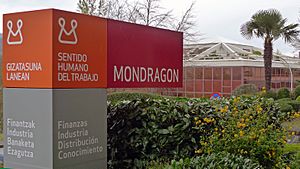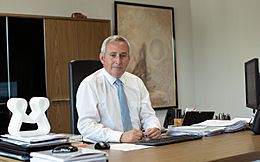Mondragon Corporation facts for kids
 |
|
 |
|
| Worker cooperative federation | |
| Founded | 14 April 1956 |
| Founder | José María Arizmendiarrieta |
| Headquarters | , |
|
Area served
|
International |
|
Key people
|
Iñigo Ucín (president of the General Council) |
| Revenue | €12.110 billion (2015) |
| Total assets | €24.725 billion (2014) |
|
Number of employees
|
Over 70,000 (2024) |
| Divisions | Finance, Industry, Retail, Knowledge |
The Mondragon Corporation is a large group of businesses in the Basque Country, Spain. It's special because it's a worker cooperative federation. This means it's made up of many companies where the workers are also the owners.
It was started in 1956 in the town of Mondragón by a priest named José María Arizmendiarrieta and some of his students. Their first product was paraffin heaters, which are like small portable heaters.
Mondragon is one of the biggest companies in Spain. It's the top business group in the Basque Country. In 2024, it had over 70,000 workers. About 30,660 of these workers were in the Basque Country, 29,340 in the rest of Spain, and around 10,000 in other countries.
Mondragon cooperatives follow special rules for how cooperatives should work. These rules are set by the International Co-operative Alliance.
Contents
How Mondragon Started
Early Days in Mondragón
In 1941, a young Catholic priest, Arizmendiarrieta, moved to Mondragón. This town had been badly affected by the Spanish Civil War. In 1943, Arizmendiarrieta opened a technical college. This school helped train future managers, engineers, and skilled workers for local companies, especially for the new cooperatives.
Arizmendiarrieta taught young people about working together and helping each other. He also stressed the importance of learning technical skills before starting a business.
First Companies and Growth
In 1955, Arizmendiarrieta chose five young people to start the first cooperative company. It was called Talleres Ulgor. Today, this company is known as Fagor Electrodomésticos, which makes home appliances.
Over the next 15 years, many more cooperatives were created. This happened as the Spanish economy started to grow. Arizmendiarrieta also helped start the Caja Laboral (a savings bank) in 1959 and Lagun Aro (a social welfare group) in 1966. These groups were very important for Mondragon's success. In 1969, Eroski was formed by combining ten small local consumer cooperatives.
From 1970 to 1990, Mondragon continued to grow. Caja Laboral helped start many new cooperatives. The Ikerlan research center was also founded in 1974. In 1984, the "Mondragon Co-operative Group" was formed. This was the start of the current Mondragon Corporation. By 1990, the group had 23,130 workers.
Growing Around the World
Mondragon started to expand internationally in the 1990s. They built factories in other countries to become more competitive. The first international factory was Copreci in Mexico in 1990. By 2013, they had 122 factories in different countries. This helped them sell more products and create jobs back home in the Basque Country.
In 2013, Fagor Electrodomésticos, a big appliance company within Mondragon, faced serious financial problems and went out of business. This meant 5,600 employees were at risk of losing their jobs. In 2014, another company bought Fagor and promised to create new jobs.
Some cooperatives have also chosen to leave the Mondragon Corporation. In 2008, Ampo (metal casting) and Irizar (coaches) left. In 2022, ULMA Group (scaffolding) and Orona (elevators) also decided to leave. These successful cooperatives used to contribute part of their profits to a fund that helped other struggling cooperatives. Even after leaving, they still work with Mondragon's university and other cooperatives.
In 2009, Mondragon made an agreement with the United Steelworkers union in the United States. They planned to create worker cooperatives in the US, based on Mondragon's model.
How Mondragon Works
A Special Business Culture
Mondragon cooperatives share a special way of doing business. It's based on people working together and sharing in the success. This culture comes from a shared goal and important values.
These values are based on 10 basic cooperative principles. Some of these include:
- Open Admission: Anyone can join.
- Democratic Organization: Workers have a say in decisions.
- Sovereignty of Labour: Work is more important than money.
- Participatory Management: Workers help manage the company.
- Inter-cooperation: Different cooperatives help each other.
- Education: Learning and training are very important.
Four main values guide Mondragon:
- Co-operation: Acting like owners and being in charge.
- Participation: Being involved in how the company is run.
- Social Responsibility: Sharing wealth fairly.
- Innovation: Always trying new and better ways of doing things.
Fair Pay for Workers
One unique thing about Mondragon is how they pay their workers. There are rules about how much more a manager can earn compared to a factory worker. For example, a general manager usually earns no more than 5 times the lowest wage in their cooperative. This ratio can be different for each cooperative, from 3 to 9 times, and workers vote on it.
Compared to other companies, Mondragon managers might earn less than managers elsewhere. But workers with lower wages often earn more than similar jobs in other local businesses. This helps create a fairer system where everyone benefits.
What Mondragon Does
Mondragon Corporation works in four main areas: finance, industry, retail, and knowledge. In 2013, the company made over €12 billion (about US$16 billion). It had 74,061 workers, making it one of Spain's largest business groups.
Money and Banking
This area includes Laboral Kutxa, which is a bank. It also has an insurance company called Seguros Lagun Aro and a social welfare group called Lagun Aro. This group helps workers with retirement, widowhood, and disability benefits.
Making Things (Industry)
Mondragon companies make many different products. These include things for everyday use, large machines, and parts for other industries. They also offer services.
Some examples of their industrial businesses include:
- Abantail: Helps design things better.
- Alecop: Provides engineering training.
- LKS Consultores: Offers legal services.
- KREAN: Architects and engineers.
- Mondragon Lingua: Provides translation and language schools.
- Ondoan: Works on energy and environmental projects.
- Orbea: Makes bicycles and sports equipment.
Mondragon is a top Spanish maker of machine tools, which are machines used to shape metal. They also make parts for cars, like brakes and engines. They produce components for home appliances, too.
In construction, Mondragon builds large structures using metal, wood, and concrete. They also make elevators through the ORONA Group.
Many of Mondragon's industrial sales come from other countries. In 2013, 71.1% of their sales were international. They have factories in countries like China, France, Mexico, and India.
Selling Things (Retail)
Mondragon runs Eroski, which is one of the biggest retail groups in Spain and southern France. Eroski has many different types of stores, including hypermarkets, supermarkets, travel agencies, petrol stations, and sports stores.
Workers and customers can both be members of Eroski and help make decisions. The retail area also includes Erkop, which handles catering, cleaning, and farming.
Learning and New Ideas (Knowledge)
This area focuses on education, training, and new inventions. These are very important for Mondragon's growth.
Mondragon University is a cooperative university. It teaches students and works closely with businesses, especially Mondragon cooperatives. Other schools like Politeknika Ikastegia Txorierri also play a big role in training.
Mondragon also invests a lot in new ideas and technology. They have 15 technology centers and R&D (Research and Development) units. These centers employ many people who work on new inventions and improvements. In 2013, they had 1,700 people working on R&D. Mondragon has many patents for its inventions.
What People Think About Mondragon
Many people see Mondragon as a successful example of a different way to run businesses.
Richard D. Wolff, an economics professor, praised Mondragon in 2012. He liked that it provided good wages, allowed workers to make decisions, and treated female workers fairly. He saw it as a working model that was different from traditional capitalism.
Noam Chomsky, a famous thinker, said in 2012 that while Mondragon is an alternative to capitalism, it still operates within a capitalist system. This means it sometimes has to make choices that might not be ideal, like exploiting workers in other countries, to survive and make a profit.
Vicenç Navarro noted that Mondragon is good at being efficient while also being fair and democratic. However, he pointed out that the number of employees who are not owners has grown. This can create a two-tier system, where worker-owners might be treated differently, for example, if a company faces problems.
The Mondragon system has inspired other groups, like Cooperation Jackson in the United States, which is a network of worker cooperatives.
See also
 In Spanish: Corporación Mondragon para niños
In Spanish: Corporación Mondragon para niños
- List of worker cooperatives
- Workers' self-management
 | Misty Copeland |
 | Raven Wilkinson |
 | Debra Austin |
 | Aesha Ash |


